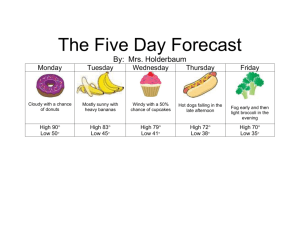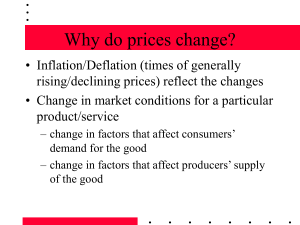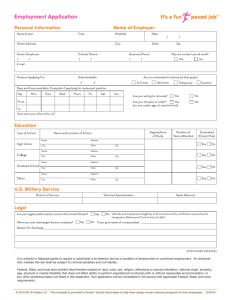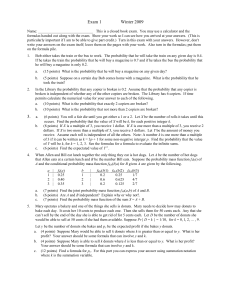W THIS MARKET BOOSTED SALES WITH BAKERY
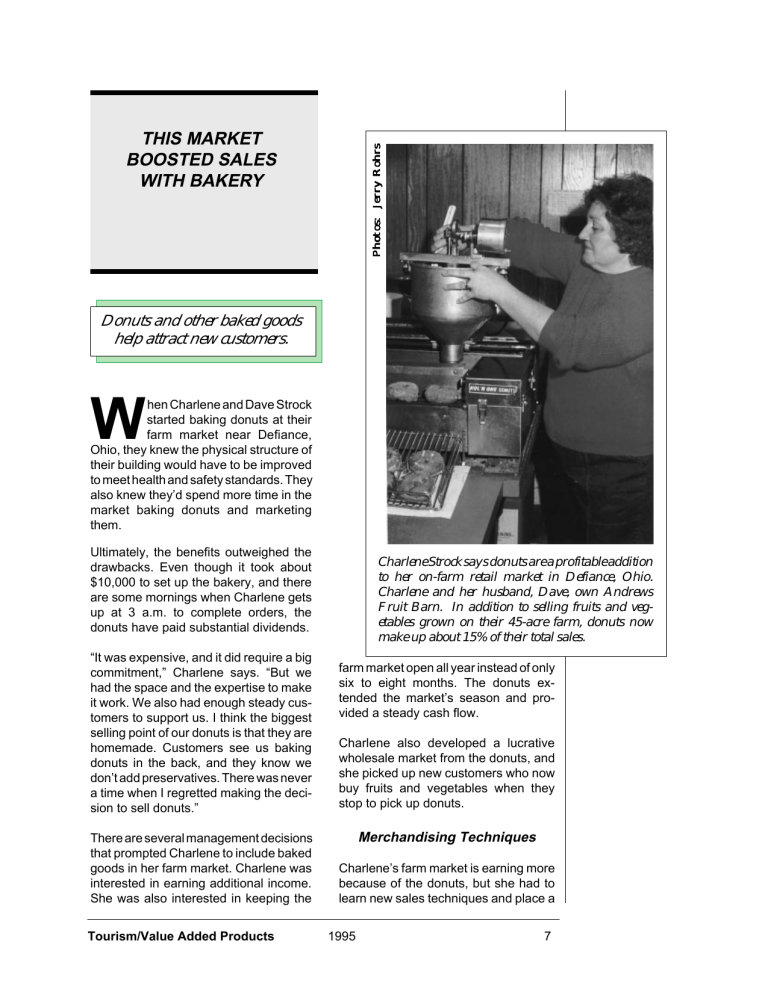
THIS MARKET
BOOSTED SALES
WITH BAKERY
Donuts and other baked goods help attract new customers.
W hen Charlene and Dave Strock started baking donuts at their farm market near Defiance,
Ohio, they knew the physical structure of their building would have to be improved to meet health and safety standards. They also knew they’d spend more time in the market baking donuts and marketing them.
Ultimately, the benefits outweighed the drawbacks. Even though it took about
$10,000 to set up the bakery, and there are some mornings when Charlene gets up at 3 a.m. to complete orders, the donuts have paid substantial dividends.
“It was expensive, and it did require a big commitment,” Charlene says. “But we had the space and the expertise to make it work. We also had enough steady customers to support us. I think the biggest selling point of our donuts is that they are homemade. Customers see us baking donuts in the back, and they know we don’t add preservatives. There was never a time when I regretted making the decision to sell donuts.”
There are several management decisions that prompted Charlene to include baked goods in her farm market. Charlene was interested in earning additional income.
She was also interested in keeping the
Charlene Strock says donuts are a profitable addition to her on-farm retail market in Defiance, Ohio.
Charlene and her husband, Dave, own Andrews
Fruit Barn. In addition to selling fruits and vegetables grown on their 45-acre farm, donuts now make up about 15% of their total sales.
farm market open all year instead of only six to eight months. The donuts extended the market’s season and provided a steady cash flow.
Charlene also developed a lucrative wholesale market from the donuts, and she picked up new customers who now buy fruits and vegetables when they stop to pick up donuts.
Merchandising Techniques
Charlene’s farm market is earning more because of the donuts, but she had to learn new sales techniques and place a
1995 7 Tourism/Value Added Products
greater emphasis on merchandising the donuts compared to other products.
Charlene says the donuts, as well as other baked goods, are more of an impulse item, which means they have to make samples available to customers to show the quality of the products. Once the customers recognize
“I think the biggest selling point of our donuts is that they are homemade. Customers see us baking donuts in the back, and they know we don’t add preservatives.”
the quality, they are more apt to return for more donuts and other products.
Charlene says another benefit of improving merchandising skills is that they boosted sales of all products.
Charlene and Dave, along with her children, Marvin and Donald Andrews, operate the 45-acre farm and retail market that’s called Andrews Fruit Barn. Marvin and Donald’s grandparents, Floyd and
Sadie Andrews, started the farm in the
1920s. The farm market was opened in
1971.
The Strock family usually grows about six acres of strawberries; five acres of tomatoes, peppers, cucumbers and green beans; 15 acres of sweet corn; five acres of muskmelon and watermelon; two acres of pumpkins and squash; and they have a 10-acre apple orchard. They also have a small cider press and sell about 3,000 gallons of cider a year. The Strocks have two greenhouses where they start vegetable plants. Charlene buys bedding plants locally and sells them in the spring.
At one time, Charlene says all of their strawberries and some of their other produce were sold on a U-pick basis. Today, she estimates that less than 50% of the produce is sold on a U-pick basis. She says customers are now less interested in picking fruits and vegetables than they were 10 years ago.
As the farm market developed a loyal following, customers began requesting a wider variety of fruits and vegetables as well as other food products. In addition to fruits, vegetables and baked goods,
Charlene sells honey, jelly, apple butter, jams, canned meat and cheese. The success with these specialty foods convinced
Charlene that donuts could be popular with her customers.
Promotional Events
The donuts attract many customers, but they are also used by Charlene to promote other products in the farm market.
In fact, the first year that she sold donuts, she ran a special promotional event in conjunction with her U-pick apple business that is now held annually.
“During the first year we sold donuts, we gave free donuts to all customers who stopped to pick apples,” she says. “We gave away one free donut and a cup of cider or coffee to everyone who went into the orchard. This promotion became successful for several reasons. Customers had a chance to taste how good our donuts taste, which brought many of them back to buy donuts.”
“Plus, this became a good public relations event for us. We make it a point to talk with our customers, and we pay close attention to their suggestions. Another important point is that people are stopping for donuts who might not have stopped for the produce.”
Charlene uses donuts in promotions when she has bumper crops of fruits and vegetables. She sometimes offers a dozen free donuts to customers who buy large quantities of produce. For example, she has given away donuts to customers who buy 25 pounds of strawberries. She has also given away fruit or vegetables to customers who buy large orders of donuts.
Charlene also uses donuts when there is a crop failure. Several years ago the strawberry crop was almost destroyed by extremely hot temperatures, and she had very few to sell. Charlene promoted a special strawberry-filled donut in advertisements just to remind customers that
Andrews Fruit Barn still handles straw-
Tourism/Value Added Products 1995 8
berries, but they would have to come back another year for the fresh berries.
Charlene mentions donuts in advertisements, but the fruit and vegetables usually get top billing. Of her total farm market income, the fresh fruits and vegetables make up about 75%. The donuts usually bring in between 11 to 16%, and the other specialty foods make up the remaining 9 to 14%.
Branching Out
In addition to the walk-in trade and impulse purchases, Charlene has developed a wholesale market for donuts. Until recently, she supplied fresh donuts daily to a local supermarket. She now sells donuts to local schools and hospitals.
She even has a unique arrangement with local nonprofit organizations to supply donuts for fund-raising events. She works with Cub Scout groups, swim clubs, the
YMCA, church choirs and youth groups, and even the high school football team.
She says the advantage of the fundraising events is that all of the donuts are pre-ordered, and she can schedule workers to fill the orders in advance.
On many merchandising, marketing and packaging matters, Charlene received advice from the company that leased the automatic donut machine to her. The company, called Hol’n One Donut Company of Ohio, sells the donut mix and also trained Charlene and her employees to operate the equipment.
Charlene has a lease-maintenance agreement with Hol’n One Donut Company.
She paid $2,500 to lease the machine which also covers all maintenance and parts.
“The initial payment of $2,500 covers the cost of using the machine for five years, and if the machine breaks down, even over a weekend, the contract says a repairman has to be here within 24 hours to repair the machine,” she says. “The maintenance agreement was one of the
Tourism/Value Added Products 1995
Top: Before Charlene and Dave began selling donuts, they offered their customers specialty foods such as jellies, jams and apple butter. Their success with specialty food products encouraged them to sell donuts.
Bottom: Charlene (middle) and
Dave agree that produce sales have increased since they started selling donuts at their market. Many customers who initially only bought donuts are now buying other products.
major selling points on the machine.
There have been times we needed service on weekends because we had wholesale orders that had to be filled.
The company promptly repaired the machine.”
“The only thing we do to honor the contract is buy the company’s donut mix. I also buy all of our shortening from Hol’n
One. It is a good arrangement because it guarantees that we will have a stan-
9
dard product that doesn’t vary in quality or taste.”
After the donuts became an established product at Andrews Fruit Barn, Charlene installed a convection oven that she uses for pies, cinnamon rolls, cookies and turnovers.
One word of advice that Charlene has for other farm marketers who are considering fresh baked goods is to make sure they meet local or state health regulations. She also says it is important to make sure you have enough liability insurance. She had to increase the market’s liability coverage when she began marketing the baked goods to wholesale markets.
Editor’s note: For more information on selling donuts and other baked goods at farm markets, you can contact Charlene
Strock, Route 6, Defiance, Ohio 43512 or call 419-393-2213; or you can contact Ron
Stryker, Hol’n One Donut Company of
Ohio, 305 Curtis St., P.O. Box 366, Delaware, Ohio 43015 or call 614-369-4800.
FROM:
Direct Farm Marketing and Tourism Handbook. Article and photos were excerpted with permission from the
Spring 1988 issue of the Rural Enterprise magazine. The magazine temporarily suspended publication with the
Summer 1992 issue.
Disclaimer
Neither the issuing individual, originating unit, Arizona Cooperative Extension, nor the Arizona Board of
Regents warrant or guarantee the use or results of this publication issued by Arizona Cooperative Extension and its cooperating Departments and Offices.
Any products, services, or organizations that are mentioned, shown, or indirectly implied in this publication do not imply endorsement by The University of Arizona.
Issued in furtherance of Cooperative Extension work, acts of May 8 and June 30, 1914, in cooperation with the U.S. Department of Agriculture, James Christenson, Director, Cooperative Extension, College of
Agriculture, The University of Arizona.
The University of Arizona College of Agriculture is an Equal Opportunity employer authorized to provide research, educational information and other services only to individuals and institutions that function without regard to sex, race, religion, color, national origin, age, Vietnam Era Veteran's status, or disability.
Tourism/Value Added Products 1995 10


